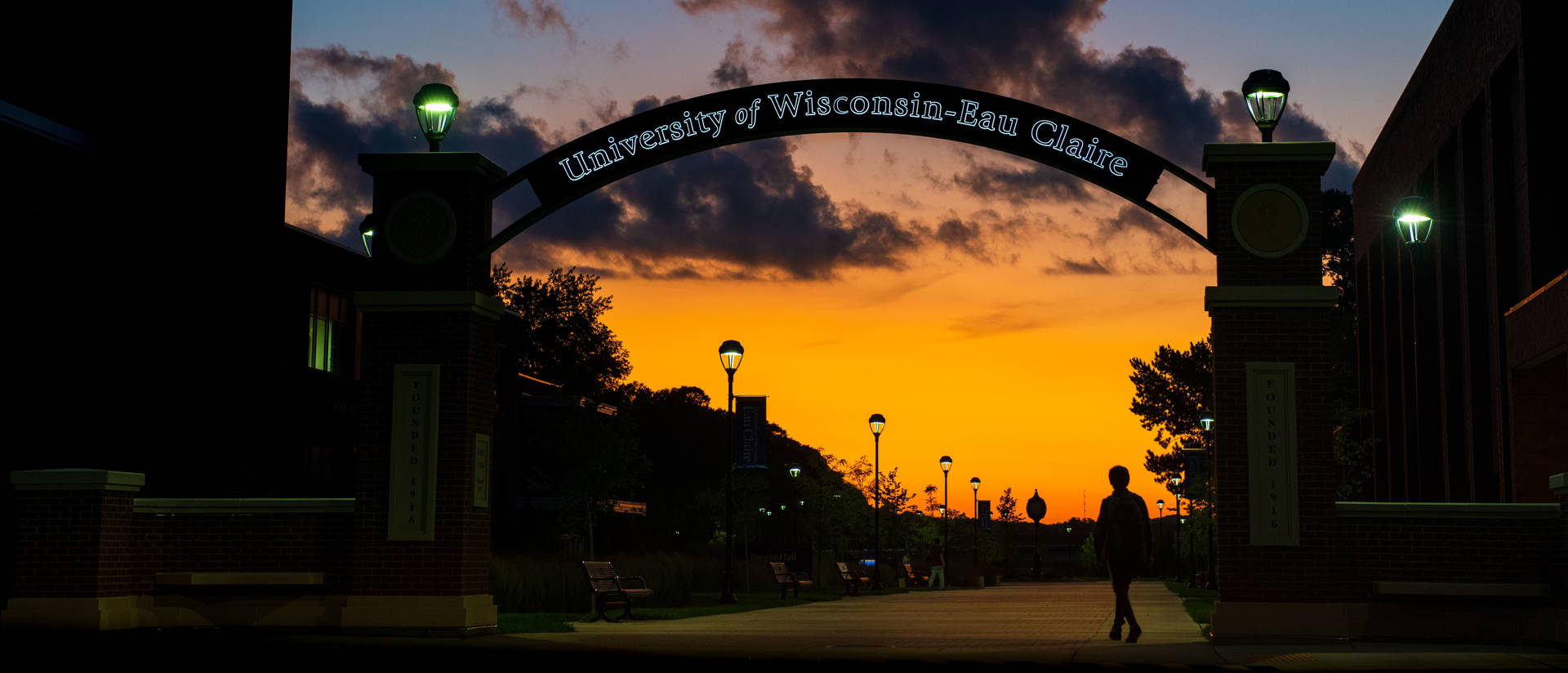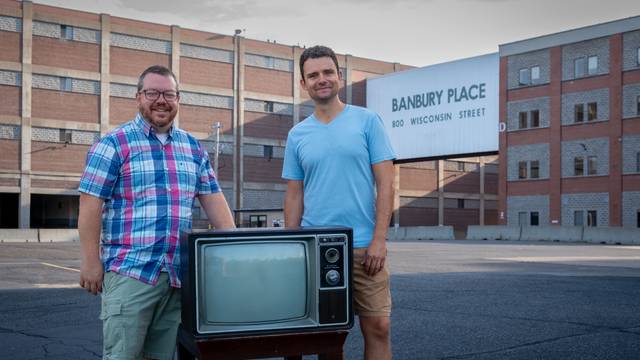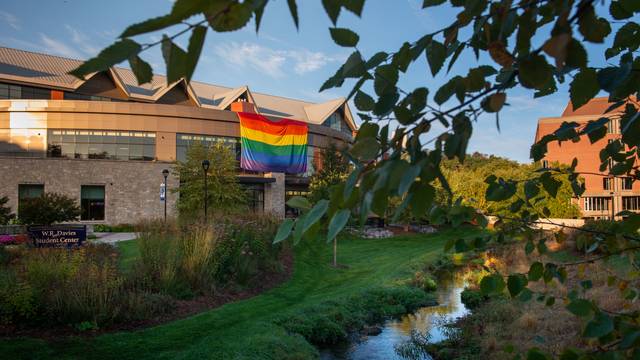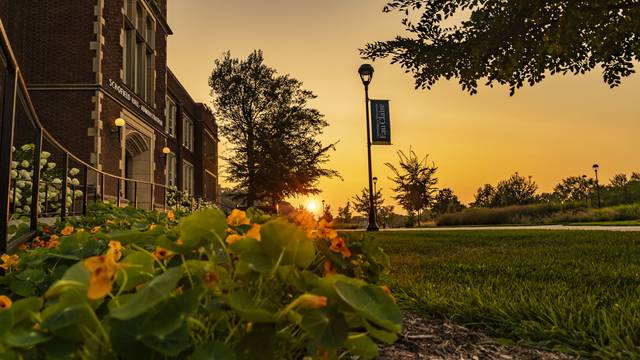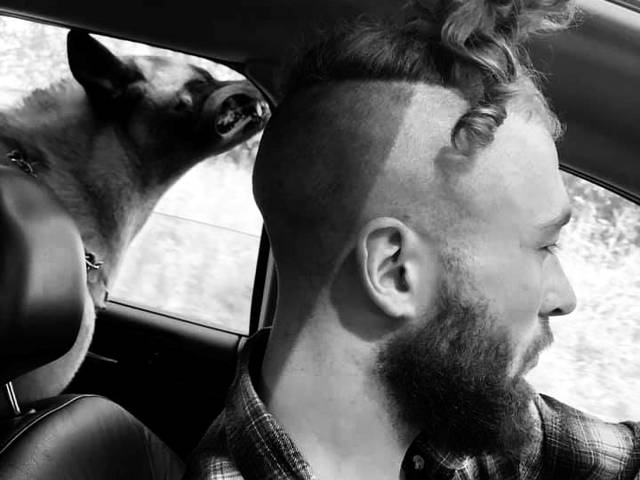
Jacob Knuth
Masters programs in Writing are notoriously competitive. Many MFA programs have admissions rates in the single digits. Applicants have to compile a representative body of work, which is an anxiety producing, labor intensive experience. Compiling your “best” work, revising what you already thought was your “best” work, asking faculty and friends to read, and re-read your writing––this, an applicant does over and over again for months. Not to mention the GRE, the application itself, and finding ways to pay for it all. We have three graduates of our English program going on to solid Masters in Writing programs in Jacob Knuth, University of Alaska – Fairbanks, Maddy Porter, UNC – Greensboro, and Tia White, University of Chicago. (Even as I write this we continue to hear from our past graduates getting into programs.) While they may have shared the same classrooms, and worked with the same faculty, each student represents UWEC English in the uniqueness of their writing and power of their voice.
here’s to the bottom-feeders, rejected across the board, layovers in waitlist city, the conditional, provisional, dismal and abysmal admissions, the altogether forgotten, there’s something about you, you aren’t just right, you aren’t too perfect, you aren’t what everybody wants, writing is damn near primordial, write how you see fit and if you don’t fit, just chuck deuces –– Jacob Knuth, “Ode to those going through the MFA process.”
Jacob can find humor in the competitive environment of graduate school admissions, now, but there’s a lot of truth in his perspective. Writing is “primordial,” which makes the whole idea of professionalizing it seem somewhat counterintuitive and paradoxical. Why make schools out of what we all do as a species? “Applying to MFAs is surely a grueling process,” says Jacob, “however having such supportive professors this year as I’ve gone through it, particularly Dr. Pace and Dr. Chan, this gave me ballast in the event I was rejected across the board and had to gear up for next cycle. Dr. Chan has always made herself available for literally any step of the process, and Dr. Pace has been in my ear about PhDs, not just the MFA. This validation has been amazing and I will prioritize maintaining a closeness with the English department at UWEC as I continue my journey through academia.”
The goal and objective, for the applicant, is obviously admission to the desired program. But as faculty, we have a wider lens and a longer view. We celebrate these accomplishments to be sure. But the relationships we build with students during the process strengthens us as teachers and bonds us with our students. All the notes and revisions, and notes and revisions, not to mention the coursework, the office hours, the emails, and so on. We can truly celebrate with them, and maybe this is also part of writing. Celebration and community. Both the community students graduate out of, and the community they join in their new programs. Dr. Chan and Dr. Pace most certainly do celebrate Jacob’s accomplishment, because they have come to know Jacob’s writing and his work. They’ve gotten closer to that primordial instinct of his to communicate.
I got to know Jacob in another context, when it seemed like his degree audit might self-implode into a constellation of boldtype “not satisfieds.” And this sheds some light on his unique perspective on perseverance. While working on his applications, Jacob was also stressing about loose ends, requirements, and petitions. We aren’t just a department, however. “We” are a community of helpful advisors and facilitators: from Dr. Goulet to our friends in ARCC, to various faculty advisors. As Jacob recounts, “My experience with the English department has been more than I could've asked for or imagined…I must have had 4-5 professors working in unison for me in order to iron out some of the more cumbersome technicalities that were left over in my degree audit being a nontraditional, multi-school transfer student completing his senior year in the middle of this pandemic. In such an unsure time, I’m eternally grateful I had the attention and support I needed to get through one of the darkest winters I’ve lived through.”
When I asked Jacob what he looks forward to, he had this to say: “I most look forward to the seemingly unlimited access to the vast wilderness that is the last frontier, especially for my dog.” This to me speaks volumes on Jacob’s prospects, so to speak, in Alaska. To be open and ready, to take the experience head on. Knowing also that community is never far away, “I also struck gold in Alaska with the English faculty there having two professors with their own connection” to Dr. Chan and Dr. Pace.
When I asked BJ Hollars for some thoughts on Maddy Porter, he had this to say: “What I admire most about Maddy’s writing is her refusal to settle for easy answers, or easy essays. ‘I write at least three different essays for every assignment in our class’, Maddy recently shared. ‘Then, I pick the one with the most potential and revise it about two or three times before turning it in’. It is the rare student who endures such a process. Yet it is precisely this level of dedication—coupled with her poetic style and attention to detail—which makes Maddy’s writing soar.”
Professor Hollars went on to add, “Maddy’s writing success is also apparent by her recent acceptances in our university’s literature, arts and music student-run publication, NOTA. Yet to my mind, more important than these publications was Maddy’s willingness to serve on the journal’s selection committee (of course, we implement strict ethical guidelines to ensure that selection committee members have no say on their own submitted work). Maddy’s generosity in supporting her fellow student writers in this way is admirable, but also, what I’ve come to expect from Maddy. Week after week, Maddy provides her classmates candid, heartfelt, and spot on critiques. Maddy is more than a writer. She is a flutist, an occasional banjo-plucker, an amateur comic book maker, a composer, a half marathon runner, and so much more. Her varied interests and talents are unquestionably the source of her writing success.”
Throughout my time here at UWEC, I’ve come to see students go on to graduate programs, enter the work force, grow as people. I don’t think this is a unique experience for faculty. If you spend enough time anywhere you’re bound to experience change. But the last seven years or so in the Midwest, and nationwide, have been uniquely unsettled times. Dr. Farrar and I moved to Eau Claire right after the death of Trayvon Martin. We arrived into our first full-time faculty jobs just as higher education was being politicized in Wisconsin. Campus life has seen its own incidents of discriminatory microaggression and outright racist intimidation. Meanwhile English Studies and Creative Writing workshops have gone through their own transformations, refined their objectives, lenses, methods, and forms of public engagement. The events of our time and the extent to which our communities see and recognize the historical legacies in present conditions informs our teaching. Our campus, also, has pushed for inclusivity and understanding. Meanwhile in our neighboring cities the weight of police profiling continues to take its toll on Black lives. The kind of violence that challenges Democratic principles effects our students. Turbulence guides the moral drive of studying what is primordial in us, to direct communication and language towards reparative ends. In short, to write, to tell of what we witness, describe and ponder what we feel about it, and speculate on what we have to learn. As teachers we know when our students hurt. When they are effected. We show up to teach not simply despite of what’s going on, but because of what’s going, and we hope our students show up too.
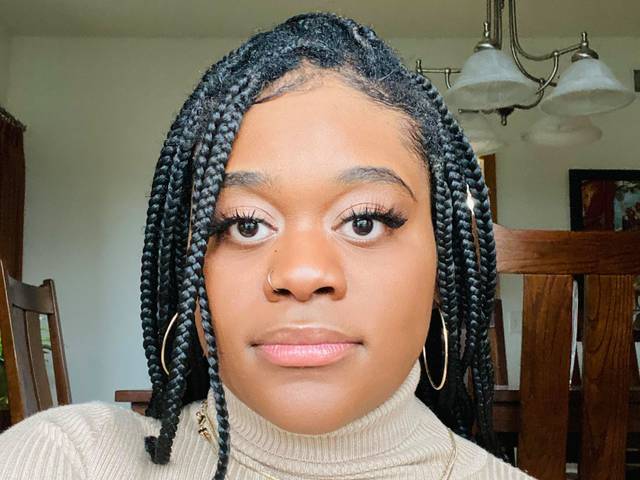
Tia White
“My experiences at UWEC changed me as an English student, a writer, and as a person in general,” reflects Tia White on the last few years in Eau Claire. “A cluster of emotions were felt at that campus, and even the hard emotions gave me lessons that were pivotal in my growth. It’s not a secret that UWEC is not diverse. It’s also not a secret that the past and recent racist incidents that involved UWEC affected a wide range of students on campus. I was one of them. (Some) Black students at UWEC felt undervalued and unheard, and that was happening inside and outside the classrooms. Imagine being a black woman in a predominately white campus, and an English major, who spends most of her time reading white authors. I’m here to tell you right now that there are numerous black authors that are worth reading. But unless you’re taking classes with English professors like Dr. Stephanie Farrar, Allyson Loomis and Dr. Joel Pace, the likelihood of you being exposed to various minority authors dwindles.”
When asked about Tia, Allyson Loomis is quick to identify Tia as “one of those students who walked into the room and changed the whole chemistry of the class, from staid to electric.” What I’ve discovered about our students is something like this, something of being conduits. They are expressive about their experiences and open to possibilities. Reflecting on the events and experiences happening on and beyond campus, Tia recognizes that it has “sparked a higher interest in my need to learn more about Black voices in literature. I stayed close with the professors that I felt were right for me and my journey and I learned what I needed and wanted. Being the only or one of the only black students in my English classes, there was always a time where I felt that I was bringing something different and important to discussions. I noticed just how much representation is effective in counteracting unknown knowledge that molds ignorance and hatred. I was able to find support with friends and within the faculty. The English department was my escape from what was going on around me, but it also made me realize that I didn’t need an escape. I just needed some real support away from home to remind me that what I had to say mattered. That I am important. And that black is beautiful. On and off paper… The idea to freely intertwine Black history and culture, with my creative writing, makes me very excited for what’s to come.”
This is the kind of response that gives me spirit when I feel like I need it most, as a teacher. Though I am speaking for myself, I think my colleagues feel similarly. Those who have worked closely with Tia, I would expect, feel a particular blush of emotion. We are a public institution. We are here for all of our students. We learn and re-learn our teaching, we adapt to the time, we keep history in mindful attention to the contemporary. As states consider legislation that will limit how teachers engage with history, and cripple their ability to educate students on the conditions of the present, I have to sit and take to heart Tia’s experience.
“[L]isten to your professors,” Tia reminds her fellow classmates and future English students, “I know you can be very protective of your work, but so much growth can come from taking that one chance. Believe in your work. And to my fellow Black and Brown writers out there, the path is hard. But your voice and everything that you have yet to say, needs to be heard. The challenge is worth the reward. Getting accepted to the Masters of Arts Program in the Humanities at the University of Chicago was the reward that I wanted for myself. Whatever you want, you can do it. Make it happen.”
Indeed, thanks to the generosity of donors like John Magliocco, we hope to help make it happen. The Magliocco Scholars is a renewable cohort award aimed at underrepresented first-year students. These students will work closely with Dr. Sarita Mizin, and not only will this increase retention, but also encourage students to participate in high impact practices like research and creative activity, as well attract future quality students. Awards like this should be a model for building structures of support, not just academic and financial support, but the informal kind of support that helps students acculturate to campus life, and develop into the kinds of students who grasp opportunities to improve our campus’s future. Tia, Jacob, and Maddy all had very different experiences during their time here, and as a department each offers us an opportunity to learn about ourselves. We show up, and will show up in the Fall, fully committed. We’re happy, and proud of our students. We face our graduates, say good bye and good luck, then return to our syllabi with the task of caring for knowledge, celebrating the primordial evidence of human communication, and ensuring that the Language we carry into the future is one that prioritizes and speaks of dignity.
